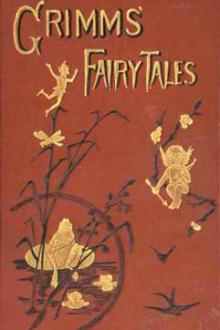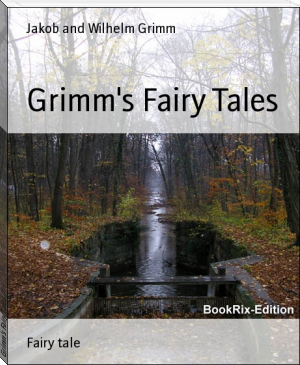Household Tales, Wilhelm Grimm [good books to read for women TXT] 📗

- Author: Wilhelm Grimm
- Performer: -
Book online «Household Tales, Wilhelm Grimm [good books to read for women TXT] 📗». Author Wilhelm Grimm
“Many thanks,” replied the old woman.
“May God help you with your fishing,” said the maiden. When the old woman heard that, she became quite friendly, and carried her over the water, gave her a wand, and said to her, “Go, my daughter, ever onwards by this road, and when you come to a great black dog, you must pass it silently and boldly, without either laughing or looking at it. Then you will come to a great high castle, on the threshold of which you must let the wand fall, and go straight through the castle, and out again on the other side. There you will see an old fountain out of which a large tree has grown, whereon hangs a bird in a cage which you must take down.
Take likewise a glass of water out of the fountain, and with these two things go back by the same way. Pick up the wand again from the threshold and take it with you, and when you again pass by the dog, strike him in the face with it, but be sure that you hit him, and then just come back here to me.” The maiden found everything exactly as the old woman had said, and on her way back she found her two brothers who had sought each other over half the world. They went together to the place where the black dog was lying on the road; she struck it in the face, and it turned into a handsome prince who went with them to the river.
There the old woman was still standing. She rejoiced much to see them again, and carried them all over the water, and then she too went away, for now she was freed. The others, however, went to the old fisherman, and all were glad that they had found each other again, but they hung the bird on the wall.
But the second son could not settle at home, and took his cross-bow and went a-hunting. When he was tired he took his flute, and made music. The King was hunting too, and heard that and went thither, and when he met the youth, he said, “Who has given thee leave to hunt here?”
“Oh, no one.”
“To whom dost thou belong, then?”
“I am the fisherman’s son.”
“But he has no children.”
“If thou wilt not believe, come with me.”
That the King did, and questioned the fisherman, who told everything to him, and the little bird on the wall began to sing, “The mother sits alone
There in the prison small,
O King of royal blood,
These are thy children all.
The sisters twain so false,
They wrought the children woe,
There in the waters deep
Where the fishermen come and go.”
Then they were all terrified, and the King took the bird, the fisherman and the three children back with him to the castle, and ordered the prison to be opened and brought his wife out again. She had, however, grown quite ill and weak. Then the daughter gave her some of the water of the fountain to drink, and she became strong and healthy. But the two false sisters were burnt, and the daughter married the prince.
97 The Water of Life
There was once a King who had an illness, and no one believed that he would come out of it with his life. He had three sons who were much distressed about it, and went down into the palace-garden and wept. There they met an old man who inquired as to the cause of their grief. They told him that their father was so ill that he would most certainly die, for nothing seemed to cure him. Then the old man said, “I know of one more remedy, and that is the water of life; if he drinks of it he will become well again; but it is hard to find.” The eldest said, “I will manage to find it,” and went to the sick King, and begged to be allowed to go forth in search of the water of life, for that alone could save him. “No,”
said the King, “the danger of it is too great. I would rather die.” But he begged so long that the King consented. The prince thought in his heart, “If I bring the water, then I shall be best beloved of my father, and shall inherit the kingdom.” So he set out, and when he had ridden forth a little distance, a dwarf stood there in the road who called to him and said, “Whither away so fast?” “Silly shrimp,” said the prince, very haughtily, “it is nothing to do with you,” and rode on. But the little dwarf had grown angry, and had wished an evil wish. Soon after this the prince entered a ravine, and the further he rode the closer the mountains drew together, and at last the road became so narrow that he could not advance a step further; it was impossible either to turn his horse or to dismount from the saddle, and he was shut in there as if in prison. The sick King waited long for him, but he came not. Then the second son said, “Father, let me go forth to seek the water,” and thought to himself, “If my brother is dead, then the kingdom will fall to me.” At first the King would not allow him to go either, but at last he yielded, so the prince set out on the same road that his brother had taken, and he too met the dwarf, who stopped him to ask, whither he was going in such haste? “Little shrimp,” said the prince, “that is nothing to thee,”
and rode on without giving him another look. But the dwarf bewitched him, and he, like the other, rode into a ravine, and could neither go forwards nor backwards. So fare haughty people.
As the second son also remained away, the youngest begged to be allowed to go forth to fetch the water, and at last the King was obliged to let him go. When he met the dwarf and the latter asked him whither he was going in such haste, he stopped, gave him an explanation, and said, “I am seeking the water of life, for my father is sick unto death.” “Dost thou know, then, where that is to be found?” “No,” said the prince. “As thou hast borne thyself as is seemly, and not haughtily like thy false brothers, I will give thee the information and tell thee how thou mayst obtain the water of life. It springs from a fountain in the courtyard of an enchanted castle, but thou wilt not be able to make thy way to it, if I do not give thee an iron wand and two small loaves of bread. Strike thrice with the wand on the iron door of the castle and it will spring open: inside lie two lions with gaping jaws, but if thou throwest a loaf to each of them, they will be quieted. Then hasten to fetch some of the water of life before the clock strikes twelve, else the door will shut again, and thou wilt be imprisoned.” The prince thanked him, took the wand and the bread, and set out on his way. When he arrived, everything was as the dwarf had said. The door sprang open at the third stroke of the wand, and when he had appeased the lions with the bread, he entered the castle, and came to a large and splendid hall, wherein sat some enchanted princes whose rings he drew off their fingers. A sword and a loaf of bread were lying there, which he carried away. After this, he entered a chamber, in which was a beautiful maiden who rejoiced when she saw him, kissed him, and told him that he had delivered her, and should have the whole of her kingdom, and that if he would return in a year their wedding should be celebrated; likewise she told him where the spring of the water of life was, and that he was to hasten and draw some of it before the clock struck twelve. Then he went onwards, and at last entered a room where there was a beautiful newly-made bed, and as he was very weary, he felt inclined to rest a little. So he lay down and fell asleep. When he awoke, it was striking a quarter to twelve. He sprang up in a fright, ran to the spring, drew some water in a cup which stood near, and hastened away. But just as he was passing through the iron door, the clock struck twelve, and the door fell to with such violence that it carried away a piece of his heel. He, however, rejoicing at having obtained the water of life, went homewards, and again passed the dwarf. When the latter saw the sword and the loaf, he said, “With these thou hast won great wealth; with the sword thou canst slay whole armies, and the bread will never come to an end.” But the prince would not go home to his father without his brothers, and said, “Dear dwarf, canst thou not tell me where my two brothers are? They went out before I did in search of the water of life, and have not returned.” “They are imprisoned between two mountains,” said the dwarf. “I have condemned them to stay there, because they were so haughty.” Then the prince begged until the dwarf released them; but he warned him, however, and said, “Beware of them, for they have bad hearts.” When his brothers came, he rejoiced, and told them how things had gone with him, that he had found the water of life and had brought a cupful away with him, and had rescued a beautiful princess, who was willing to wait a year for him, and then their wedding was to be celebrated and he would obtain a great kingdom. After that they rode on together, and chanced upon a land where war and famine reigned, and the King already thought he must perish, for the scarcity was so great. Then the prince went to him and gave him the loaf, wherewith he fed and satisfied the whole of his kingdom, and then the prince gave him the sword also wherewith he slew the hosts of his enemies, and could now live in rest and peace. The prince then took back his loaf and his sword, and the three brothers rode on. But after this they entered two more countries where war and famine reigned and each time the prince gave his loaf and his sword to the Kings, and had now delivered three kingdoms, and after that they went on board a ship and sailed over the sea. During the passage, the two eldest conversed apart and said, “The youngest has found the water of life and not we, for that our father will give him the kingdom the kingdom which belongs to us, and he will rob us of all our fortune.” They then began to seek revenge, and plotted with each other to destroy him. They waited until they found him fast asleep, then they poured the water of life out of the cup, and took it for themselves, but into the cup they poured salt sea-water. Now therefore, when they arrived home, the youngest took his cup to the sick King in order that he might drink out of it, and be cured. But scarcely had he drunk a very little of the salt sea-water than he became still worse





Comments (0)